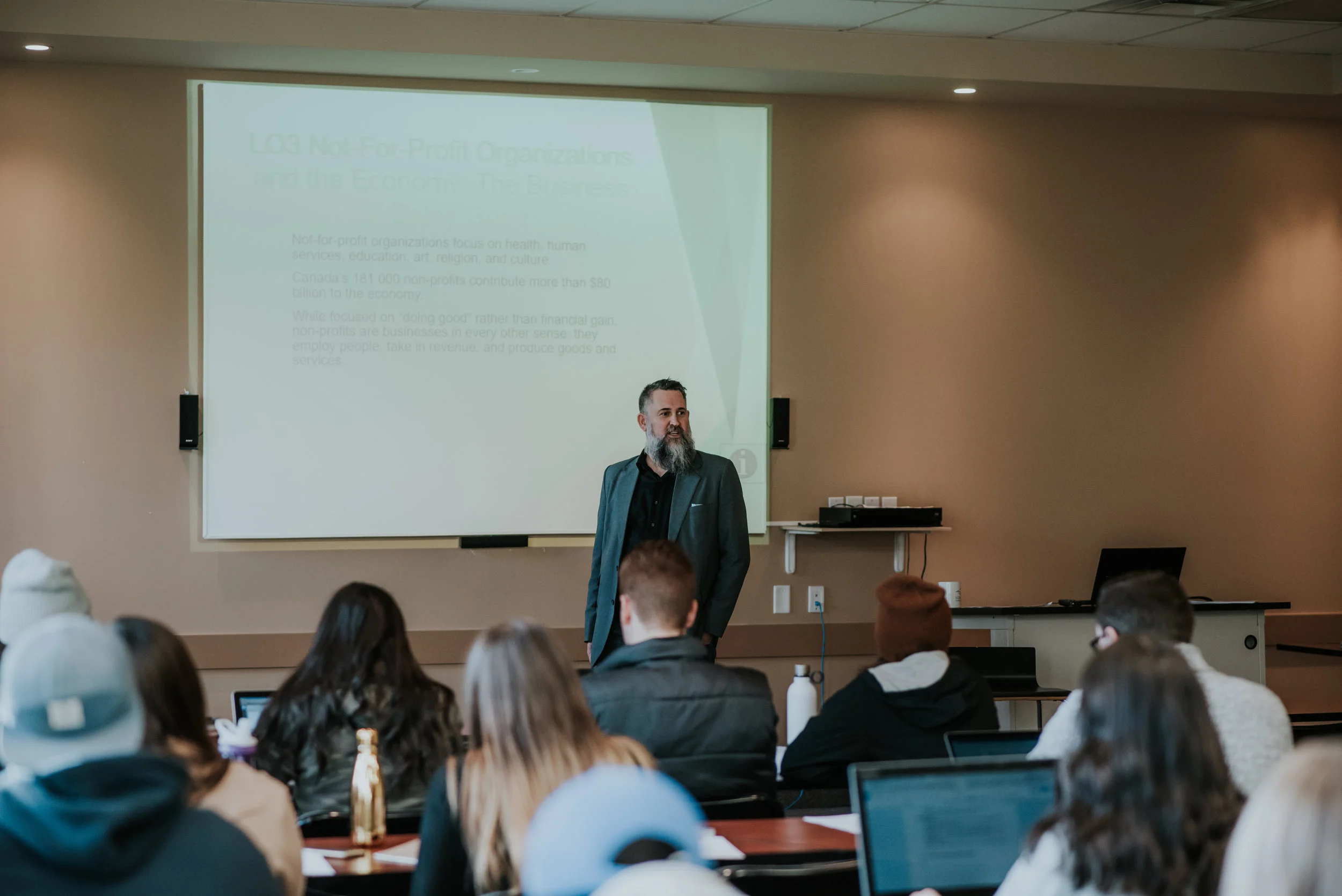Our History
The college logo reflects Summit Pacific College's location on a mountain near the Pacific Ocean in the Fraser Valley
The college crest embodies a cross to symbolize the redemptive work of Christ, an open Bible for the world, a flame representing the Holy Spirit, and a maple leaf to represent Canada.
The Greek motto means "Competency through Christ."
The college crest colours are: red, gold and sky-blue. Red speaks of the blood of Christ, gold of His deity, and blue of the heavenly destiny of God's people.
Campus
In 1941, when the ministers of British Columbia and Yukon District of the Pentecostal Assemblies of Canada gathered for their Conference in Vancouver, they were greatly concerned for the need of young people who were seeking to answer God's call to the Christian ministry. A suitable college for the training of such youth was seen to be an urgent need. Thus, the invitation by the official board of Glad Tidings Tabernacle of Victoria was gladly accepted, and within the facilities of that church, the British Columbia Bible Institute opened its doors in the fall of 1941. The founder and first President was Rev. Ernie W. Robinson.
As the years passed the growing college felt the need for its own campus and residences. Thus, in 1951, it moved to a residential campus in North Vancouver. In 1962 British Columbia Bible Institute was renamed Western Pentecostal Bible College. A program to add buildings and facilities saw a steady upgrading of the original plant. Nevertheless, it became evident that future requirements called for larger accommodations outside of urban restrictions. As early as 1966 there was a preliminary land purchase, but it was not until 1971 that the present site was acquired.
New campus construction began in 1973, and the college took occupation in the fall of 1974. The three original buildings (the Eric A. Hornby Memorial Academic Building, the William J. Friesen Residence, and the Ernie W. Robinson Dormitory) were augmented by the Vernon Morrison Residence in 1977 and the P.S. Jones Memorial Auditorium in 1979. The Mary Ellen Anderson Memorial Chapel was built in 1986 and the Lorne Philip Hudson Memorial Library was built in 1988. The L. T. Holdcroft Residence (2001) replaces the original Ernie W. Robinson Dormitory (1974). The Phil and Jennie Gaglardi Memorial Auditorium (2004) replaces the P.S. Jones Memorial Auditorium (1979). A new academic wing was added in 2010 called the Revival and Learning Centre.
Leadership
Head administrators who have served the college over the years have included: Ernie W. Robinson, 1941-56; Tom Johnstone, 1956-58; Vernon R. Morrison, 1959-68; Dr. L. Thomas Holdcroft, 1968-87; and Dr. James G. Richards, 1987-2006. The current President is Dr. Dave L. Demchuk who began his administrative leadership in December 2006.
The classroom ministry and administrative leadership as Dean and Principal of Rev. W.J. Friesen extended over many years, and he served under three presidents. Rev. and Mrs. A.J. Schindel ministered as classroom instructors and in some administrative capacities over an eighteen-year period from 1944 to 1962. Dr. Roger Stronstad taught courses from 1974 until 2016 and was the Dean of Education from 1986-2005. Dr. Wilf Hildebrandt has served as Dean of Education since 2005. After 20 years as Dean of Education he retired in June of 2025. Dr. Melody Deeley was appointed to be the Vice President of Academics from July 2025.
From the early years of the developing college, the British Columbia District Executive of the Pentecostal Assemblies of Canada was designated as the "Bible School Committee", and it thereby served as the Board of Governors. The District Superintendent was considered Chairman of the Board. In 1955, this arrangement was given formal sanction by approval of the District Conference. Thereafter, the District Executive, when meeting on matters concerning the college, was designated the Board of Governors. A group from within the Board, known as the Administrative Committee, was formed to handle matters involving some college business matters. However, campus administrators attend to the regular business matters of the institution through the Operations Committee.
Academics
In the District Conference of 1966, full endorsement was given for an expansion of the academic curriculum, and that fall the first stages of the additions were implemented. In March 1967, the British Columbia Provincial legislature granted the college a charter officially recognizing it as "a Theological College" and conferring upon it "the power to provide instruction and grant degrees in Theology, Religious Education and Sacred Music only." The charter became law when it was proclaimed in 1981.
After the move to Abbotsford was completed, it was decided to seek accreditation with the goal of granting undergraduate degrees. The college curriculum was reviewed, further developed, and refined, and the academic preparation of its faculty systematically upgraded. The library was upgraded, and the college board and academic senate were reorganized to conform to American Association of Bible College guidelines (AABC). After receiving candidate status (1976) and associate status (1978) Western was awarded full accreditation in 1980.
Once Western’s accreditation was in place the College Board petitioned the National Bible College Committee of the Pentecostal Assemblies of Canada for permission to grant degrees. At the Graduation ceremony in April 1982, Western awarded bachelor’s degrees to qualifying graduates for the first time in its history.
Accreditation was reaffirmed by the AABC in 1985, 1990, and 2000. In 2004 the association was renamed the ABHE (Association for Biblical Higher Education). SPC’s accreditation was reaffirmed in 2011 for ten years by the COA of the ABHE.
In 2017 the college engaged in a self-study process which culminated in the submission of documentation required for the reaffirmation of accreditation. The extensive report submissions, interviews and evaluation conducted by a Team of Evaluators in 2020 was concluded in March 2021. This was a very positive process for the college and the Association for Biblical Higher Education through the Commission on Accreditation re-affirmed SPC’s accreditation for another ten years (to 2031). The college anticipates continued growth and development during the next decade of ministry.
Graduate Studies
Since 2015 SPC has offered graduate level studies that previously were taught through the Canadian Pentecostal Seminary at the Association of Theological Schools in Langley, B.C. [TWU campus]. Summit’s School of Graduate Studies (SGS) continues the mandate of CPS and offers courses of interest to Pentecostals while providing a track for PAOC credential seekers.
Since 2015 the SGS has delivered several certificates that require completion of five courses. Subject matter for each graduate certificate includes Studies in Pentecostal Theology, Church and Para-Church Leadership, New Testament Studies, and Youth Ministry.
In the Fall semester of 2022, Summit began offering two MA degrees--the MA In Youth Ministry, and MA in Theology and Spiritual Leadership. Graduate students who have completed courses or a one-year certificate will receive credit towards their MA degree. The first 2 graduates from the Masters program earned degrees in 2025.
Students may also transfer their Summit School of Graduate Studies courses to the following institutions if they so desire: Southeastern University, TWU/ACTS Seminaries, Regent College. Academic credits from five core courses are pre-approved to be transferrable to certain study programs in the above-mentioned institutions.
Name Change
In March 2003 Western Pentecostal Bible College was renamed Summit Pacific College by an act of the British Columbia Provincial Legislature. The prospects for Summit Pacific College continue to be both encouraging and challenging. Sacrificial efforts by a host of dedicated participants and friends have built a solid foundation. Spiritually, academically, and financially Summit is firmly established. Over 80 years of ministry the college has experienced much progress.
Alumni
As of April 2024, a total of 2388 students have graduated from SPC with diplomas or degrees. Many others have earned certificates. The majority of these now hold posts of responsibility as ministers, missionaries, church musicians, Christian educators, youth leaders, and similar vocations within the staffs of churches, church related institutions, charities, community service organizations and marketplace ministries. Typically, more than one-half of the pastors of the Pentecostal Assemblies of Canada churches in British Columbia are alumni of the college. Many Summit graduates serve in provinces throughout Canada.














